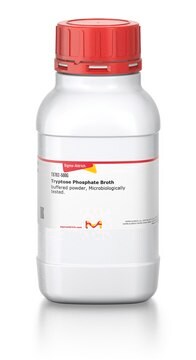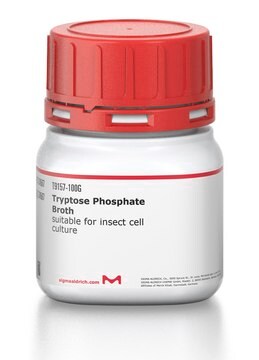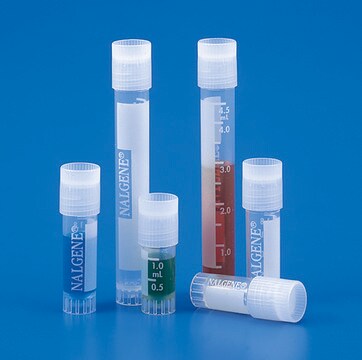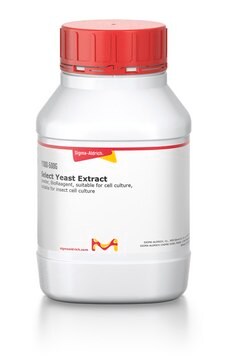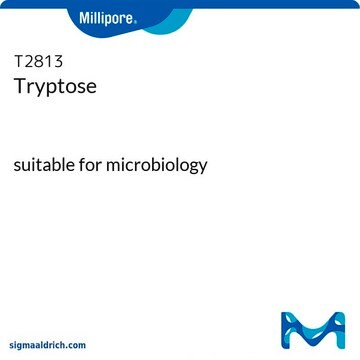T8159
Tryptose Phosphate Broth solution
sterile-filtered, suitable for cell culture
Sinónimos:
TPB solution
Iniciar sesiónpara Ver la Fijación de precios por contrato y de la organización
About This Item
UNSPSC Code:
12352205
NACRES:
NA.75
Productos recomendados
sterility
sterile-filtered
Quality Level
form
solution
concentration
29.5 g/L in deionized water
technique(s)
cell culture | mammalian: suitable
shipped in
ambient
storage temp.
room temp
Application
In addition to its use for the growth of fastidious micro-organisms, Tryptose Phospate Broth (TPB) has been studied as supplement for the preparation of media that supports vaccine production in BHK-21 cells and the growth of SF21 insect cells in high-density perfusion culture stirred-tank bioreactors.
Components
Tryptose Phosphate Broth (TPB) is composed of four components: Tryptose (20g/L); Dextrose (2g/L); NaCl (5g/L) and Disodium Phosphate (2.5g/L) typically adjusted to pH 7.3. The tryptose component is a peptone (mixture of amino acids and short peptides) derived by the mixed enzymatic hydrolysis (pancreatic enzymes) of the milk protein casein. This hydrolysate provides a source of amino acid based nutrients and survival factors that support the growth of fastidious micro-organisms such as Brucella, Streptococcus, and Neisseria; as well as eukaryotic cells such as insect and animal cells. Dextrose provides a fermentable carbohydrate that can be used by fastidious mico-organisms. Sodium chloride maintains the osmotic and ionic equilibrium and disodium phosphate provides the basic buffering capacity.
comparable product
Storage Class
10 - Combustible liquids
wgk_germany
WGK 2
flash_point_f
Not applicable
flash_point_c
Not applicable
Elija entre una de las versiones más recientes:
¿Ya tiene este producto?
Encuentre la documentación para los productos que ha comprado recientemente en la Biblioteca de documentos.
Los clientes también vieron
Dong-Hwan Kim et al.
Molecular biotechnology, 63(2), 140-149 (2021-01-03)
Selection of guide RNA (gRNA) is important to increase the efficiency of gene editing in the CRISPR/Cas9 system. Due to the variation in actual efficiency of insertion/deletion (indel) mutation among selected gRNAs in silico, reliable methods for validation of efficiency
S N Saha et al.
Vaccine, 7(4), 357-363 (1989-08-01)
Studies were undertaken to develop a cheaper medium with indigenous sources of peptone and casein hydrolysate for continuous culture of BHK-21 (suspension) cells and production of foot-and-mouth disease (FMD) vaccine. Eleven batches of experimental media were prepared using different indigenous
A I Josemans et al.
Annals of the New York Academy of Sciences, 969, 141-146 (2002-10-17)
The in vitro culture of Cowdria ruminantium, the causative agent of heartwater in domestic ruminants, was first achieved in 1985. Culture media were usually supplemented with serum and tryptose phosphate broth, both undefined components, contributing to great variability. Recently, we
Faizal Z Asumda et al.
Differentiation; research in biological diversity, 101, 16-24 (2018-04-08)
A variety of approaches have been developed for the derivation of hepatocyte-like cells from pluripotent stem cells. Currently, most of these strategies employ step-wise differentiation approaches with recombinant growth-factors or small-molecule analogs to recapitulate developmental signaling pathways. Here, we tested
Mark Smyth et al.
Frontiers in immunology, 12, 638485-638485 (2021-07-02)
Cytotoxic T lymphocytes (CTLs) represent key immune effectors of the host response against chronic viruses, due to their cytotoxic response to virus-infected cells. In response to this selection pressure, viruses may accumulate escape mutations that evade CTL-mediated control. To study
Nuestro equipo de científicos tiene experiencia en todas las áreas de investigación: Ciencias de la vida, Ciencia de los materiales, Síntesis química, Cromatografía, Analítica y muchas otras.
Póngase en contacto con el Servicio técnico